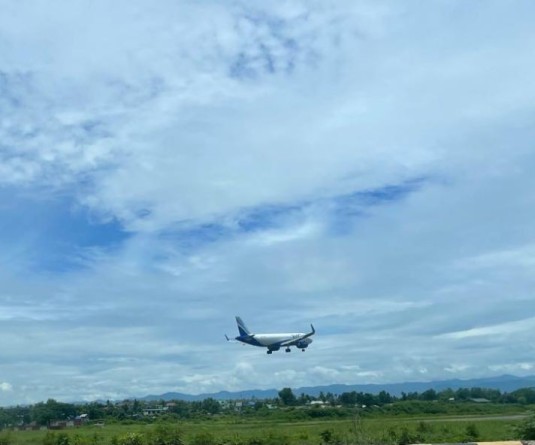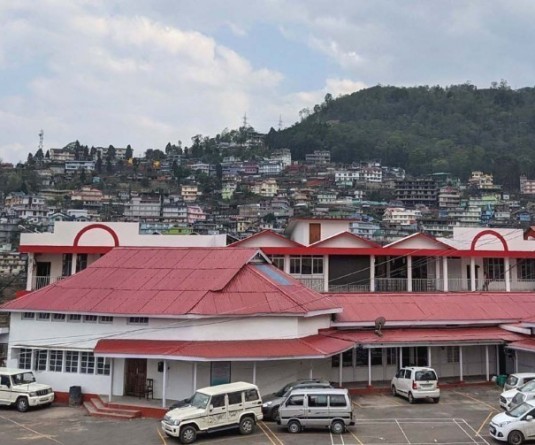Prof Dolly Kikon, Director, Center for South Asian Studies, University of California, Santa Cruz at Kohima on August 18.

Morung Express News
Kohima | August 18
Even as unbreathable air, unbearable temperature and unimaginable disparity have been witnessed across South Asia, “in Nagaland, Kohima is really at the centre whether in terms of water scarcity or the impending ecological disaster that we see” as pointed out by Prof Dolly Kikon, Director, Center for South Asian Studies (CSAS), University of California, Santa Cruz on Monday.
She was speaking at the international workshop on “Ecologies of care: Centering Indigenous worlds” organised by Department of History & Archaeology, Nagaland University, Kohima Campus and Center for South Asian Studies (CSAS), University of California, Santa Cruz at De Oriental on August 18.
As a first indigenous director for South Asian studies in North America, she said, it was also to envision “how do we center who we are and our position not in a narrow way but in a broader and a global way.” She explained that this was how Ecologies of Care was initiated not as a single program but a 3-year-initiative where there will be conversations on the campus with the first Nations colleagues and people from the state of California and also across America which will include United States and Canada as well as here in South Asia with communities who identify themselves historically as indigenous.
She also highlighted that in partnership with the University of British Columbia in Canada, Simon Fraser University and Lincoln University in New Zealand, this initiative in 2024 invited scholars at the forefront of the social sciences, arts and the humanities to address liveability as a desired condition for all.
It also adopted an indigenous lens for the colonial assessment of the current socio ecological situation in South Asia and the paths forward for a liveable future for all. “I believe in South Asia and globally, us as Naga voices have a huge contribution to make”, she stated in this regard.
If we are making pathways in the field of poetry, literature, social science, arts and the humanities, she underscored that, “this is a field where our voices are important” while also posing, “What does it mean to live in this time of changing climate?”
Stating that existing situation forces us to reassess our methodological tools as well, she pointed out that “this speaks to all of us as researchers, as writers, as poets and as storytellers.”
She further asserted that, “centering care means adopting an ethic of responsibility, connections and respect rather than the established notions of neutrality and objectivity.”
“Ecologies of care as a framework for life encourages scholars to reconfigure their independent research practice as interconnected notes of life sustaining forms of knowledge and co-creation,” she added.
Need for Indigenous Assertions
Underlining that indigenous communities need to have their assertions, Prof Jagadish K Patnaik, Vice-Chancellor, Nagaland University, Lumami who addressed the workshop online stated the importance of the workshop “not only to develop the tools and methodologies, but also to get ourselves identified and accepted.”
Stating that various indigenous communities are now disappearing, he impressed upon the need to retain individual indigenous identities through their historical roots. He said that Naga itself is also a democratic concept wherein there is space for them in the larger democratic framework called Indian civilization.
He further commended Professor Tiatoshi for doing a commendable job while describing him as one of the pioneers not only of Nagaland University but the Northeast in developing the methodology as well as various strategies for exploring the dynamics of this region.
Also stating pleasure on the collaboration, he hailed Dolly Kikon as the ambassador of India in terms of culture, history and archaeology.
Earlier, Adela Moa, Director, Department of Art and Culture inaugurated “Naga Lithic Worlds: An Exhibition of Stone Artefacts from the Naga Collection at the Pitt Rivers Museum, Oxford University.”
‘Weaving justice & sovereignty into indigenous life’
‘Ecologies of Care’ was founded on collaborative dialogue and co-learning to explore the Himalayan region’s various intersections, expressions, and care practices.
By centering Indigenous philosophies, worldviews, and experiences, the initiative views the Himalayan region as one where communities live creatively despite the odds and struggles. Storytelling and Indigenous practices to care for land and community are considered as significant sites to reflect on pedagogy, theory, and sustainable futures.
Ecologies of Care weave aspirations for justice, equality, and sovereignty into the everyday fabric of Indigenous life. The one day event focussed on engagement scholarship, community participatory research approaches, and storytelling as part of Indigenous theory.
In conversation with knowledge keepers, students, academics, and storytellers, it also dwelt on what it means to be Indigenous in the 21st century and an invitation to reflect on existing methodological tools, and explore new imaginations, and adopting an ethic of responsibility, connections, and respect as research pathways.





